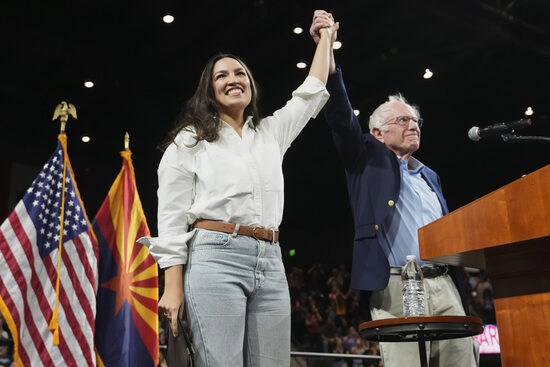Can Bernie Sanders train the next generation of progressive candidates?
Sen. Bernie Sanders of Vermont may not be eyeing higher office again, but he’s still drawing thousands of supporters and raising serious money, making him one of the Democratic Party’s biggest forces. Now Sanders is using that momentum to boost the next generation of progressive leaders.
According to Politico, Sanders is teaming up with Run for Something and other outside groups to help would-be candidates with the nuts and bolts of campaigning—how to file, hire, raise money, and win. The effort could usher in a wave of young, unapologetically progressive lawmakers ready to take the baton from the 83-year-old icon of the left.
It’s quite different from the Democratic establishment, which has long resisted making room for younger, more liberal voices. But with Sanders’ backing, progressives—and even independents—may finally see a clearer path to elected office.

“We want to make sure that we’re not just going into these spaces and holding rallies and disappearing, and we’re not just asking people to run for office,” Jeremy Slevin, a top adviser for Sanders, told Politico. “We’re giving them the tools they need to actually do it.”
Unsurprisingly, interest is high. Politico reports more than 5,000 people have already signed up with Sanders’ operation to explore a run. That enthusiasm tracks with the senator’s continued ability to pull in large crowds and major grassroots donations, even with his next Senate election not until 2030.
The rallies tell the story. Sanders and New York Rep. Alexandria Ocasio-Cortez, his progressive ally and presumed political heir, recently packed an estimated 36,000 people in Los Angeles and 34,000 in Denver during recent stops on their “Fighting Oligarchy” tour. Their message—anti-Trump, anti-billionaire, pro-working class—cuts through in a way few others in the party can manage.
That blunt message of resistance is clearly resonating. As many Democrats seek “common ground” with Republicans, Sanders and Ocasio-Cortez are offering something else: a blunt indictment of a system rigged in favor of the rich. And voters seem to be listening. An April Change Research poll found 90% of Democrats and Democratic-leaning independents prefer a “moderate fighter” over a “quiet progressive”—but 95% would choose a “progressive fighter” over a “quiet moderate.” Those numbers held steady across age, race, and ethnicity, echoing the kind of candidate Sanders hopes to elevate.
“It is really exciting to see Bernie model bringing in a new generation of leaders for all other older Democrats,” Amanda Litman, president of Run for Something, told Politico. “It is not enough to just be at the front—you got to build power that sticks behind you.”

In Congress, that next generation is emerging. Ocasio-Cortez remains one of the most prominent voices on the left. Reps. Jasmine Crockett of Texas and Maxwell Frost of Florida—both reportedly eyeing the top spot on the House Oversight Committee—are helping to lead a more vocal and confrontational flank of the party.
Ocasio-Cortez hasn’t revealed her 2028 plans. Aides say she’s not focused on a potential presidential run, and early polling shows she could be a formidable primary challenger to Senate Minority Leader Chuck Schumer, who would be up for reelection that year. She may also stay in the House. Regardless of which path she takes, she’s the clearest heir to Sanders’ movement.
Meanwhile, other progressive outsiders are mounting primary challenges to Democratic incumbents. According to Federal Election Commission data, three progressive candidates challenging sitting Democrats raised over $70,000 each in the first quarter of 2025 (excluding loans, refunds, and miscellaneous receipts). Two—Kat Abughazaleh in Illinois’ 9th District and Elijah Manley in Florida’s 20th—even outpaced their incumbent opponents.
Sanders and his allies are especially focused on candidates under 40—a smart play for a party that’s long delayed a generational handoff. With voter appetite growing for bold, progressive fighters, that delay may finally be running out of time.
